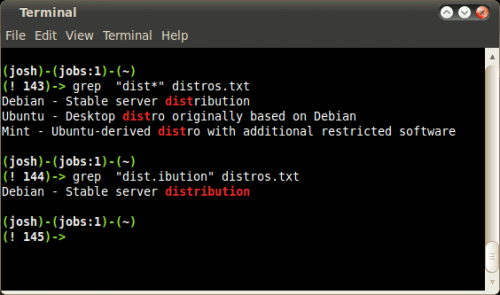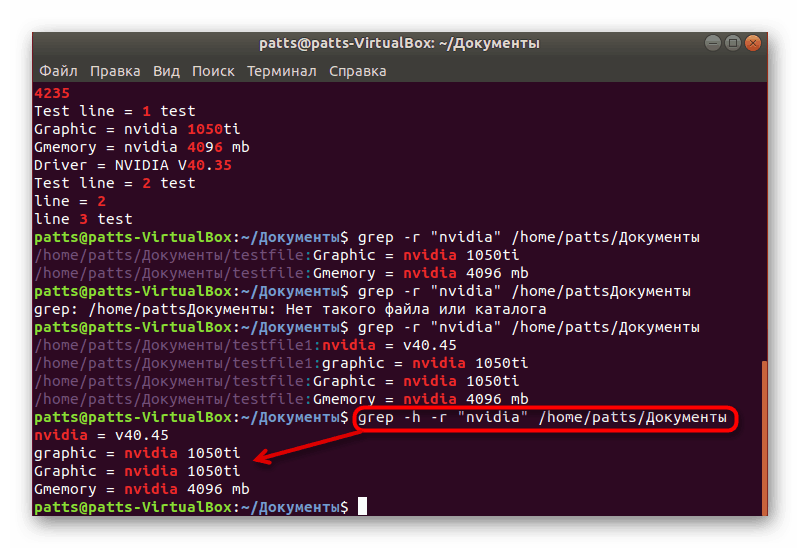

Grep command linux how to#
The inclusion of the file names in the output data can be suppressed by using the -h option as follows:Īddresses1=192.168.1.5 24 192.168.1.2 How to use grep to search words only You will see result for 192.168.1.5 on a separate line preceded by the name of the file (such as /etc/ppp/options) in which it was found. read all files under each directory for a string “192.168.1.5”

$ cat /etc/passwd | grep -i "boo" How to use grep recursively The last grep -i "boo" /etc/passwd can run as follows using the cat command too: For instance, type the following command: You can force grep to ignore word case i.e match boo, Boo, BOO and all other combination with the -i option. Hence pass the -w option with the grep/fgrep command to get only lines where “California” is included as a whole word: Please note that the above command also returns lines where “California” is part of other words, such as “Californication” or “Californian”. For example, to list all the lines of a file named address.txt in the current directory that contain the word “California”, run: We can use fgrep/grep to find all the lines of a file that contain a particular word. Search the /etc/passswd file for a user named ‘boo’, enter: Grep -F 'pattern' filename # same as frgrep grep 'word' file1 file2 file3Ĭat otherfile | grep 'something' command | grep 'something' command option1 | grep 'data' grep -color 'data' fileNameįgrep words file How do I use grep to search a file on Linux? # Interpret PATTERNS as fixed strings, not regular expressions (regex) when fgrep used. Let us see all commands and options in details. Search and display the total number of times that the string ‘nixcraft’ appears in a file named frontpage.md:.Look for all files in the current directory and in all of its subdirectories in Linux for the word ‘httpd’:.Perform a case-insensitive search for the word ‘bar’ in Linux and Unix:.Search any line that contains the word in filename on Linux:.grep command examples in Linux and Unixīelow is some standard grep command explained with examples to get you started with grep on Linux, macOS, and Unix: For most use cases, fgrep is sufficient due to speed and only looking into strings and words. The grep utilities are a family that includes grep, egrep, and fgrep for searching files. We can search and match the whole word which is separated with spaces by using the -w option.The name, “grep”, derives from the command used to perform a similar operation, using the Unix/Linux text editor ed: $ grep ismail /home/ismail/Downloads Search Whole Wordīy default the grep command searches and matches specified terms in some part of the line or word.
Grep command linux full#
$ grep ismail *Īlternatively, we can specify another directory providing its absolute or full path like below. In the following example, we search the term “ismail” in all files in the current working directory. The bash glob operator can be used to specify all files at the specified directory. $ grep ale MyFile.csv YourFile.csv AllFiles.csv Search All Files In Specified DirectoryĪnother useful feature of the grep command is searching all files in the specified directory. The files we want to search can be specified after their search term by separating their spaces. Grep command provides useful options where searching for multiple files is one of them. $ grep ale /home/ismail/MyFile.csv Grep Multiple Files

We can also specify the file we want to search as an absolute or full path like below. In the following example, we search “ ale” in the text file “ MyFile.csv“. s, -no-messages suppress error messagesĪ specified text can be searched in the specified file. z, -null-data a data line ends in 0 byte, not newline no-ignore-case do not ignore case distinctions (default) i, -ignore-case ignore case distinctions in patterns and data e, -regexp=PATTERNS use PATTERNS for matching P, -perl-regexp PATTERNS are Perl regular expressions G, -basic-regexp PATTERNS are basic regular expressions E, -extended-regexp PATTERNS are extended regular expressions PATTERNS can contain multiple patterns separated by newlines. Įxample: grep -i 'hello world' menu.h main.c The grep command provides a lot of options and help information about these options can be displayed with the -help option like below. FILE is single file or directory where all files will be searched for the TERM.TERMS is single or multiple terms which are searched in the specified FILE or redirected input.The grep command has the following syntax. PATTERNS can be simple text, number, string, or regex (regular expressions). From an academic point of view, the grep command searches for PATTERNS in each FILE. The grep command is the very popular command used to filter string, text, and data in files and command outputs.


 0 kommentar(er)
0 kommentar(er)
